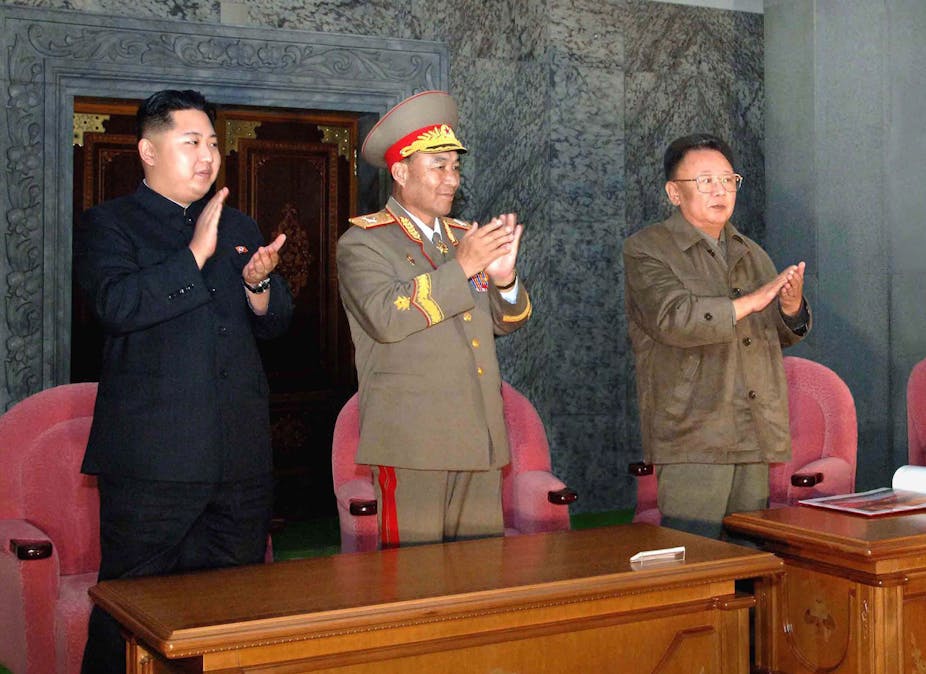Kim Jong-il, the mercurial “Dear Leader” of Democratic People’s Republic of Korea (North Korea), died of heart failure on 17 December 2011, at the age of 69.
One could be excused for not believing in the “rumour” in the first instance, since the long-time serving dictator appeared healthy in the official photos this year despite having suffered stroke earlier.
That is, until one watched the news announced by a crying presenter on North Korean television. It has dawned on the international community that we no longer have this seemingly unpredictable and reclusive Kim with high heels and funny air to entertain ourselves.
Regional concerns
Why would the region, and great powers like the United States and China, take the death of such a leader so seriously? North Korea has long been an impoverished country in the prosperous Northeast Asia, a political relic from the Cold War, and a repressive Stalinist state.
However, Kim became a prominent figure in international diplomacy thanks to the nuclear weapons Pyongyang has developed since the mid-1990s, and his role as master player of nuclear brinkmanship. Far from bluffing, he proved himself capable of manipulating far stronger states, often into playing against each other, except that North Korean people have been paying a huge price.
There has been fear of proliferation of nuclear know-how and materials to other rogue states and terrorists, and even of Kim’s regime using nuclear weapons.
On the other hand, Pyongyang might well have resorted to the nuclear game as a desperate but well-calculated game of regime survival, considering its political, diplomatic and economic vulnerability, and security paranoid in the aftermath of the regime changes achieved by the “Coalition of the Willing” in Iraq and Afghanistan.
Being named as a member of the “axis of evil” and “outpost of tyranny” by Washington merely reinforced Pyongyang’s determination to hold on to the bombs and missiles. Meanwhile, neighbouring states fear for consequences of a regime collapse in Pyongyang or war on the peninsula. As a result, the six-party talks (the only serious international efforts to solve the nuclear crisis) have not achieved any substantiative progress.
Security crisis?
North Korea poses the most immediate security concern in the post-Cold War Asia, and implications for regional security continues to be the main prism through which we discuss North Korea without the “Dear Leader”.
However, it is difficult to predict such implications. If many made mistakes in predicting Soviet Union and China before, then one should be double cautious in guessing the future of North Korea, which is not just a very closed society but also the only communist one-party state with a touch of family dynasty.
The third generation Kim (Jong-un) has just become the new leader, seemingly in the same way as Kim Jong-il inherited power when his father Kim Il-sung died in 1994. However, what meets the public eye can be notoriously misleading. The substance of regime transition may become clearer after some time. Regime collapse in the style of Arab Spring seems unlikely, since we have never seen any sign of organised opposition inside the country.
Political chaos cannot be ruled out but one can safely say that the neighbouring states, particularly China and South Korea, will try their best to prevent this, if only for different security and ideological reasons. What’s more likely to transpire is a less despotic regime in Pyongyang which may or may not have the inexperienced Kim Jong-un, who did not become official heir apparent until last year, at the top.
Such a regime may be more susceptible to international and regional pressure, particularly China’s influence. This will be a mixed but overall positive development for the region.
The role of China
China remains committed to a nuclear weapon-free Korean peninsula, one reason being its wariness about implications of a nuclear North Korea for Japan’s nuclearisation. Also, regime collapse worries China in terms of regime legitimacy in Beijing itself and security in China’s Korean autonomous region. What suits Beijing is a North Korea functioning as a cushion between China and the US.
Beijing hopes to see the country reformed and recognised by the West but remaining under the Chinese influence. To achieve this, nuclear brinkmanship or military sabre rattling is not to be encouraged. In this context, engagement policy from Japan and “Sunshine Policy” of South Korea will also enjoy larger wiggle room.
Ultimately, it is easier to achieve some breakthrough regarding the Korean nuclear crisis (after all the Clinton administration came close to that in its dying days) than solve the broadly defined Korean issue – namely a divided nation with sharply different political systems and diplomatic alliances, struggling for an uncertain future of reunification.

